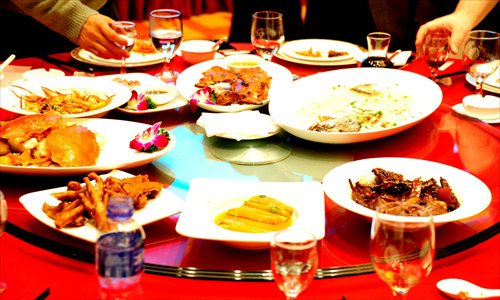HOME >> CHINA
Critical moments
By Lin Meilian Source:Global Times Published: 2013-12-17 19:33:01

A banquet. Photo: IC
For many government officials, the past year has been hard on them. For starters, the nationwide anti-corruption crackdown on "tigers and flies" has been quite a challenge. Then the anti-"four winds" campaigns that aim to bolster discipline in the Party seem to have gone beyond their comfort zone.As President Xi Jinping pointed out, officials should "watch from the mirror" to live up to people's expectations, "groom themselves" to correct their mistakes, "take a bath" to keep a clean mind, and then "seek remedies" to educate those who have done wrong.
The purpose is clear, to serve the people. "Winning or losing public support is an issue that concerns the CPC's survival or extinction," the Xinhua News Agency quoted Xi as saying, stressing that the mass line, or furthering ties with the people, is the lifeline of the Party.
Public confession
"I feel like I am a character from a grass-roots TV drama when I do fact-finding tours. Everything is planned in advance, all I need to do is show up and read some lines in front of the camera," a Party member in Hebei Province said, as part of a self-criticism session in September.
The self-criticism was viewed by millions when it was broadcast on China Central Television (CCTV). For about 30 minutes, the news showed President Xi presiding over a "democratic life meeting" with members of the Party Committee of Hebei Province, as part of the ongoing "mass line" campaign which aims to boost ties between 85 million CPC members and the people.
Right after the 18th National Congress of the CPC in November last year, the new leaders introduced an "8-point" policy to fight formalism and extravagance. In June, a one-year "mass-line" campaign was launched to keep the Party close to the people, which was accompanied by a nationwide anti-corruption campaign to crack down on high-ranking "tigers" and lowly "flies" at the same time.
"After becoming the Party secretary of Hebei, I desired so strongly to make achievements that I did not pay much attention to the people's concerns," Zhou Benshun said during what was labeled a "democratic life meeting." He also criticized some of his colleagues for being too impatient to take advice and being arrogant.
However, carrying out honest criticism is not easy. The millions of people watching had no idea that the half-an-hour long speech had been rewritten over 20 times.
"For a very long time, criticism and self-criticism was just a formality, people joked that it was 'compliment and self-compliment'," Jiang Yong, a researcher at the Center of National Strategic Studies, told the Global Times.
Since July, the "democratic life meeting" has been carried out nationwide in 31-provincial level administrations and from top government officials to ordinary Party members. One of the common themes to emerge is that Party members feel like they are distancing themselves from the general public.
Blowing away the 'four winds'
Chairman Mao said that with the Marxist-Leninist weapon of criticism and self-criticism, society can "get rid of bad styles and keep the good."
But those "bad styles" have now taken on the forms of formalism, bureaucracy, hedonism and extravagance, also known as the "four winds."
In June, the newly-elected leaders published a list of banned items and practices aimed at the four winds. The list included: "No welcome banners, no red carpet, no floral arrangements or grand receptions for officials' visits," according to a statement. It also bans political bureau members from attending ribbon-cutting events, celebrations or seminars without approval.
The list is expanding. It also bans shark fins, cigarettes and up-market liquors at official dinners, and prohibits military officials from holding State-funded banquets.
The anti-four winds campaign has seen some high-end restaurants close down, and a sharp fall in their business in the capital. SOEs also banned expensive lottery gifts such as iPads or iPhones at year-end parties. Tigers and flies
The anti-four winds campaign is being accompanied by an anti-corruption campaign, in which President Xi vowed to crack down on "tigers as well as flies."
Speaking at a CPC disciplinary watchdog meeting, Xi vowed to keep "power reined within the cage of regulations." "Party cadres at various levels should keep in mind that no one can enjoy absolute power outside of the law," Xi was quoted by Xinhua .
The country stepped up efforts in fighting corruption after the 18th National Congress. By October, about 15 provincial-level government officials had been removed from their positions, including Li Chuncheng, former vice secretary of the CPC committee of Sichuan Province, and Zhou Zhenhong, a high-ranking official in Guangdong. The misdeeds of four of them were exposed on the Web, such as Liu Tienan, former deputy director of the National Development and Reform Commission, who was accused of taking bribes by a reporter. Another two were exposed by their mistresses, including a district Party secretary of Chongqing who was removed from his position after a sex tape scandal.
Over 70 percent of the cases were reported by the people or other officials. To further encourage the grass roots to report corrupt officials, the discipline bodies, the CPC Central Commission for Discipline Inspection (CCDI) and the Ministry of Supervision jointly launched an official website in September.
The country's top corruption fighter, Wang Qishan, the secretary of the CCDI, encourages his colleagues to watch the American political drama House of Cards, an anonymous source told the Phoenix Weekly magazine. The source said Wang highlighted the role of the "Party whip" in the drama to ensure discipline in the Party.
"To forge iron you need a strong body," Wang was quoted by Xinhua when he described the fight against corruption.
Zhao Jingshu contributed to this story
Posted in: Society, In-Depth